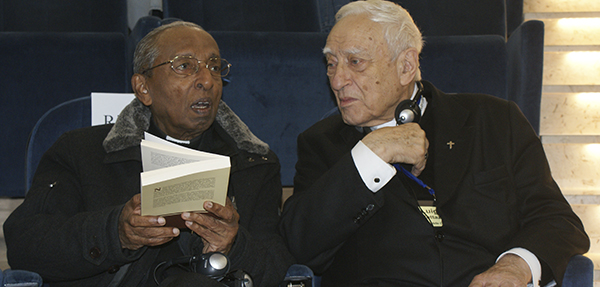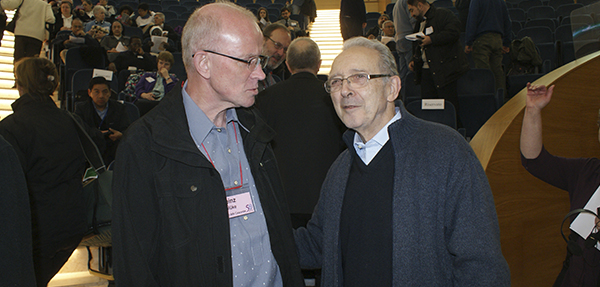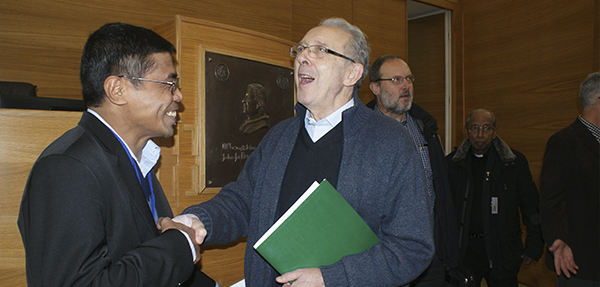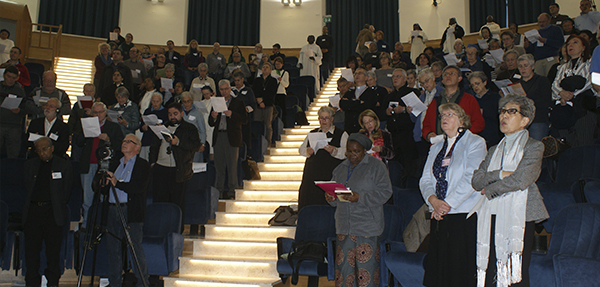Urbaniana University, Rome
November 14, 2015To celebrate 50 years of the Pact of the Catacombs, scores of bishops, priests, religious and laypeople gathered at the Pontifical University of Urbaniana for the seminar “A poor Church serving the Poor - The Pact of the Catacombs and its Impact Today”. The seminar was arranged by the Union of Superiors General of the female and male religious congregations (USG/UISG), the Documentation and Research Center on Mission (SEDOS), the Divine Word Missionaries (SVD), and the Pontifical University of Urbaniana.
The relevance of the seminar and the Pact, as such, was clearly pointed by Sr. Sally Hodgson, Vice President of UISG: “Sharing the history of the Pact of the Catacombs and what has happened since then, is a meaningful way for all of us to commemorate the 50th anniversary” To put into perspective the Pact of the Catacombs Profesor Alberto Melloni of the University of Modena, RE spoke lengthily of its historical context. Fr. Jon Sobrino, a well-known theologian in Central America, in his presentation, The Impact of the Catacombs for the Church today said, “I do not feel qualified to judge how the Church today wholly lives, or not live the Pact of the Catacombs…..Pope Francis works to reform the Church and moves between denouncement and mercy. He generates hope and encourages everyone to re-make a Pact to rebuild today a poor and servant Church. Pope Francis makes present the pact of the catacombs in this way”.
Notably present in the seminar was one of the signatories of the Pact, the Emeritus Bishop of Ivrea and Council Father Luigi Bettazzi. During his intervention, he reiterated with enthusiasm the events leading to the signing of the Pact and the atmosphere surrounding the Second Vatican Council. On the other hand the Emeritus Bishop of the Archdiocese of Paraiba, Brazil, Dom José Maria Pires, also one of the remaining signatories of the Pact along with Bettazzi, sent a message via video He reiterated the joy of living simply and being with the poor, a consequence of the Pact that continues to challenge Bishops, priests and religious to this day.
Fr. Norbert Arntz, head of the Institute of Theology and Politics (ITP) of Münster, Germany, which has been promoting the memory of the Pact for several years, remarked in his testimony, “The Pact of the Catacombs is a prophetic tradition that we want to connect with, renew and update. It questions the way of life in industrial societies, intervenes in the conflicts of our time together and develops political and theological visions about how to be a world where everyone can live.” In a similar tone, Roger Marie Élie Cardinal Etchegaray, President Emeritus of the Pontifical Council for Justice and Peace, stated in a message that was read, “Only a poor Church can become a missionary Church, and only a missionary Church may require a poor Church”.
The book “The Pact of the Catacombs, The Mission of the Poor in the Church,” edited by Jose Antunes da Silva, SVD and Xabier Pikaza was formally launched. The book seeks to make known the Pact of the Catacombs, its content and its implications for the life of the Church. It is a text and a program that sets out the mission of the poor in the church.
The participants at the seminar shared their thoughts and reflections on how to contextualize the Pact in today’s realities for the local Churches, for the religious, and the witness of all Christians in the world and the society of today. Fr Superior General of the Society of the Divine Word, Heinz Kulüke addressing the congregation, said: “To be there for people and one with those who need us most is probably the essential message and invitation of ‘the Pact of the Catacombs’ to all Christians and particularly to church leaders and religious. This Pact requires a change in attitude and a change of structures as well.
The participants take to heart the Pact of Catacombs as a guiding force in the mission of the Church to this day. Listening to the proceedings was Cardinal Joao Braz de Aviz, Prefect of the Congregation for Institutes of Consecrated Life and Societies of Apostolic Life, who came for the occasion. Fr. Alberto Trevisio, IMC, Rector of the Pontifical University of Urbaniana welcomed the participants and the speakers.
Fr. Sonny de Rivera, SVD












